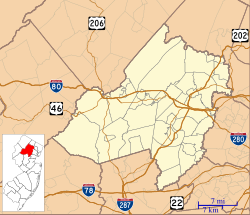Green Village, New Jersey
| Green Village, New Jersey | |
|---|---|
| Unincorporated community | |

Post office in Green Village, NJ
|
|
| Green Village's location in Morris County (Inset: Morris County in New Jersey) | |
| Coordinates: 40°44′21″N 74°27′13″W / 40.73917°N 74.45361°WCoordinates: 40°44′21″N 74°27′13″W / 40.73917°N 74.45361°W | |
| Country |
|
| State |
|
| County | Morris |
| Township | Chatham and Harding |
| Named for | Ashbel Green |
| Elevation | 249 ft (76 m) |
| ZIP code | 07935 |
| GNIS feature ID | 0876795 |
Green Village is an unincorporated community located within portions of both Harding Township and Chatham Township in Morris County, New Jersey, United States. It is located just north of the Great Swamp National Wildlife Refuge. It is named after Ashbel Green, former president of Princeton University.
Green Village has its own post office and fire department, as well as a plant nursery known as the Farm, a deli, a Methodist church, and a gas station.
Green Village principally consists of three streets, namely Green Village Road, Meyersville Road and Britten Road. Subject to an ongoing surveying controversy it may include a portion of Woodland Road.
Students attend schools in either Harding Township or Chatham, depending on which side of Green Village they live in.
Prior to 1922, the Madison Fire Company responded to fire alarms in the Green Village area. In March 1922 a formal meeting was held in the school house, now the Green Village Deli. Chief Philhower of the Madison Fire Company explained the requirements and responsibilities of a volunteer fire company and gave advice on how to organize one. Papers of incorporation were drawn up and signed by the men present at the meeting, thus becoming charter members of the company. The certificate of incorporation was issued on April 17, 1922.
On November 22, 1922, a group of women met at the school house an organized the Green Village Ladies Auxiliary, their mission being to "aid and benefit the firemen and foster a spirit of friendliness among the community". The first social affair was a dance held at Holly Hill Farm in December 1922. While the fire house was being built, the Auxiliary raised money though suppers, teas and card parties.
One of the fire company's first requirements was that each member purchase a fire bucket to be kept ready for emergencies at all times. The buckets had rounded bottoms so that they could not be set down and instead had to be hung; it was thought that buckets with flat bottoms would be used for a variety of purposes and would not be available when and alarm sounded. The buckets were actually used at several fires by forming two lines of firemen between the waters source and the fire. One line of men passed buckets of water to the fire while the other passed back the empty buckets for more water.
...
Wikipedia



